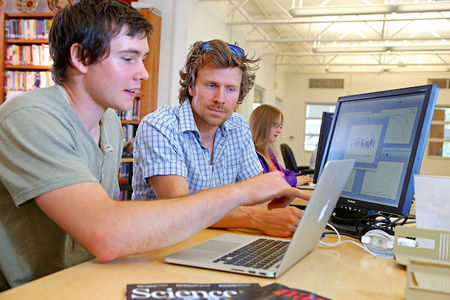Research Experiences for Undergraduates 2018
From Santa Fe Institute Events Wiki
| Research Experiences for Undergraduates 2018 |
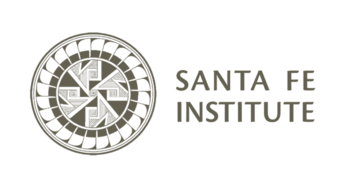
2018 RESEARCH EXPERIENCES FOR UNDERGRADUATES
June 3 - August 11, 2018
Program Overview
The ability to mathematically model complex systems has become a prerequisite to successful science in any field. Writing a simulation is not enough; career scientists today should be able to analyze results, recognize statistical regularities, formulate conjectures, and pursue possible proofs about why these conjectures are true. This hands-on summer program will give you a toolbox for understanding and using mathematical modeling in complex systems and your discipline.
The Santa Fe Institute’s Undergraduate Fellowship uses an integrated approach. The program is transdisciplinary, with problems, methods, and data sets drawn from across science. You will move back and forth freely along a spectrum of methods learning how to:
- Design a mathematical model of a physical, biological or social system
- Identify opportunities to solve this model exactly or approximately
- Code and run simulations of the model
- Analyze your simulations’ running time and memory use to improve their efficiency
- Test results against theoretical predictions and real-world data sets
- Formulate new conjectures based on your results and try to prove or disprove them
This program is of special interest to you if you’re from computer science (CS), pure and applied mathematics, and physics, and we also welcome applicants from chemistry, quantitative biology, and social science. We aim to build your capacity for computational and mathematical modeling, and train you within a group who will support each other in building a wide range of skills. For example, CS students can help mathematics students with their programming, mathematics students can help physics and CS students with their theoretical analyses, and biology or social science students can help others to ground their models in reality. We want you to recognize that what may be easy for you can be intimidating to others and vice versa; we want to help you build knowledge collaboratively to become fearless about learning new skills and acquiring tools and techniques beyond your current comfort zone.
If you are looking for a chance to do independent research, we encourage you to apply — especially if you are a highly talented student who attends an institution with limited research opportunities. Women and minorities are especially encouraged to apply.
Your main work will be a small-group research project working with SFI mentors. Prior to your SFI residency you will be asked to complete SFI’s MOOC “Introduction to Complexity.” You will also attend tutorials on the basics of data analysis, including concepts from computation, linear algebra, and statistics throughout the summer.
Participants are expected to be in residence in Santa Fe for approximately 10 weeks, from June to August, 2018.
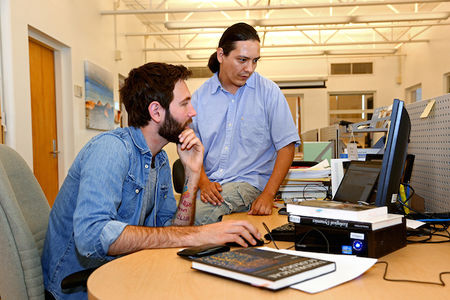
"Over the summer I studied scientific papers and books in order to gain the background information that was needed to do my research project. I did a lot of programming as well. However, the most memorable part of the summer for me was the atmosphere at the Santa Fe Institute. I was surrounded by fascinating ideas and immersed in lively debates daily!"
-Ronnie Garduño, 2011 REU cohort
Support
Housing and a meal plan will be provided, at no cost to the student, in double-occupancy rooms with shared bathrooms at a nearby college in Santa Fe. Modest living stipends will also be provided to interns during their stay, along with some support of round-trip travel expenses from the home institution. Because Santa Fe lacks a full public transportation system, we encourage those interns who can bring their private transportation to do so.
Eligibility
For the purposes of this program, an undergraduate student is one who is enrolled in a degree program (part-time or full-time) leading to a bachelor's degree. Students transferring from one institution to another who are enrolled at neither institution during the intervening summer may participate. College seniors graduating in Spring 2018 are not eligible. High school graduates who have been accepted at an undergraduate institution but who have not yet started their undergraduate study are also eligible to participate.
Strong mathematical skills and experience with a programming language are favorably considered. Students from all backgrounds in the physical, natural, and social sciences are invited to participate. Applicants are welcome from any country. International students will need to be sponsored on an F-1 visa by their home institution (contact your international office at your university to inquire about CPT/OPT status). Women and minority students are encouraged to apply.
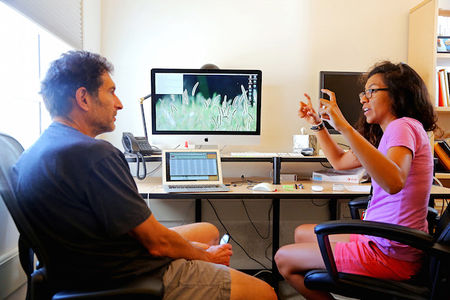
Application Requirements
- Current Resume (C.V.).
- Statement of interests (see application for details).
- Two (2) letters of recommendation (see application for details).
- Transcript(s) must be sent by the university or college you attended. Be sure to request your transcripts from the registrar sufficiently in advance so that we receive these records by the January deadline. Electronic transcripts preferred. Email to: education@santafe.edu
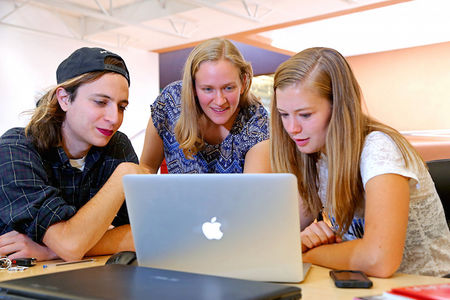
To Apply
APPLY NOW HERE
We will be accepting applications from October 6, 2017 to January 4, 2018. Applicants will be notified by e-mail in late January regarding the status of their applications.
Transcripts should be emailed to education@santafe.edu
Or mailed to:
Santa Fe Institute - REU Program
, 1399 Hyde Park Rd.,
Santa Fe, NM 87501
For further information about the program, please e-mail education@santafe.edu, or call (505) 946-2726.
The Santa Fe Institute REU Program is supported by the National Science Foundation under Grant Number ACI-1358567 and the ASU-SFI International REU Fellows are funded by Arizona State University
Any opinions, findings, and conclusions or recommendations expressed in this material are those of the author(s) and do not necessarily reflect the views of the National Science Foundation or Arizona State University

